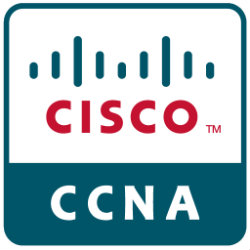Overview
Cisco Certified Network Associate
(We are teaching the new Cisco certified Network Associate (CCNA) curriculum related to CCNA exam 200-301)
Cisco certified Network Associate (CCNA) is a very popular and highly demanded computer industry certification courses in Information Technology.
This more advanced certification course provides a comprehensive introduction to deploying Cisco routers and switches in computer networks. Cisco devices are the industry standard devices that are used to connect computers in local area networks and the internet. Through extensive hands-on exercises, students gain the fundamental knowledge and skills needed to install, configure and troubleshoot Cisco routers and switches. CCNA certified professionals are in great demand in the computer industry today.
| Course Name | Start Date | End Date | Days | Session Dates | Time | Tuition | Hours | Register |
|---|---|---|---|---|---|---|---|---|
| CCNA | TBD | TBD | TBD | TBD | TBD | $1,499.00 | 40 |
Who this course is for
This course is designed for individuals who have computer networking experience and wish to prepare for skills in the installation, configuration and administration of Cisco routers, switches and network connectivity. A+ and Network+, or the equivalent in experience or training, are prerequisites for this course.
What you’ll learn
- Identify the components of a computer network and describe their basic characteristics
- Understand the model of host-to-host communication
- Describe the features and functions of the Cisco Internetwork Operating System (IOS®) software
- Describe LANs and the role of switches within LANs
- Describe Ethernet as the network access layer of TCP/IP and describe the operation of switches
- Install a switch and perform the initial configuration
- Describe the TCP/IP Internet layer, IPv4, its addressing scheme, and subnetting
- Describe the TCP/IP Transport layer and Application layer
- Explore functions of routing
- Implement basic configuration on a Cisco router
- Explain host-to-host communications across switches and routers
- Identify and resolve common switched network issues and common problems associated with IPv4 addressing
- Describe IPv6 main features and addresses, and configure and verify basic IPv6 connectivity
- Describe the operation, benefits, and limitations of static routing
- Describe, implement, and verify Virtual Local Area Networks (VLANs) and trunks
- Describe the application and configuration of inter-VLAN routing
- Explain the basics of dynamic routing protocols and describe components and terms of Open Shortest Path First (OSPF)
- Explain how Spanning Tree Protocol (STP) and Rapid Spanning Tree Protocol (RSTP) work
- Configure link aggregation using EtherChannel
- Describe the purpose of Layer 3 redundancy protocols
- Describe basic WAN and VPN concepts
- Describe the operation of Access Control Lists (ACLs) and their applications in the network
- Configure Internet access using Dynamic Host Configuration Protocol (DHCP) clients and explain and configure Network Address Translation (NAT) on Cisco routers
- Describe basic Quality of Service (QoS) concepts
- Describe the concepts of wireless networks, which types of wireless networks can be built, and how to use Wireless LAN Controllers (WLCs)
- Describe network and device architectures and introduce virtualization
- Introduce the concept of network programmability and Software-Defined Networking (SDN) and describe smart network management solutions such as Cisco DNA Center™, Software-Defined Access (SD-Access), and Software-Defined Wide Area Network (SD-WAN)
- Configure basic IOS system monitoring tools
- Describe the management of Cisco devices
- Describe the current security threat landscape
- Describe threat defense technologies
- Implement a basic security configuration of the device management plane
- Implement basic steps to harden network devices
Course Content
CCNA Course
- Network fundamentals
- Network access
- IP connectivity
- IP services
- Security fundamentals
- Automation and programmability

